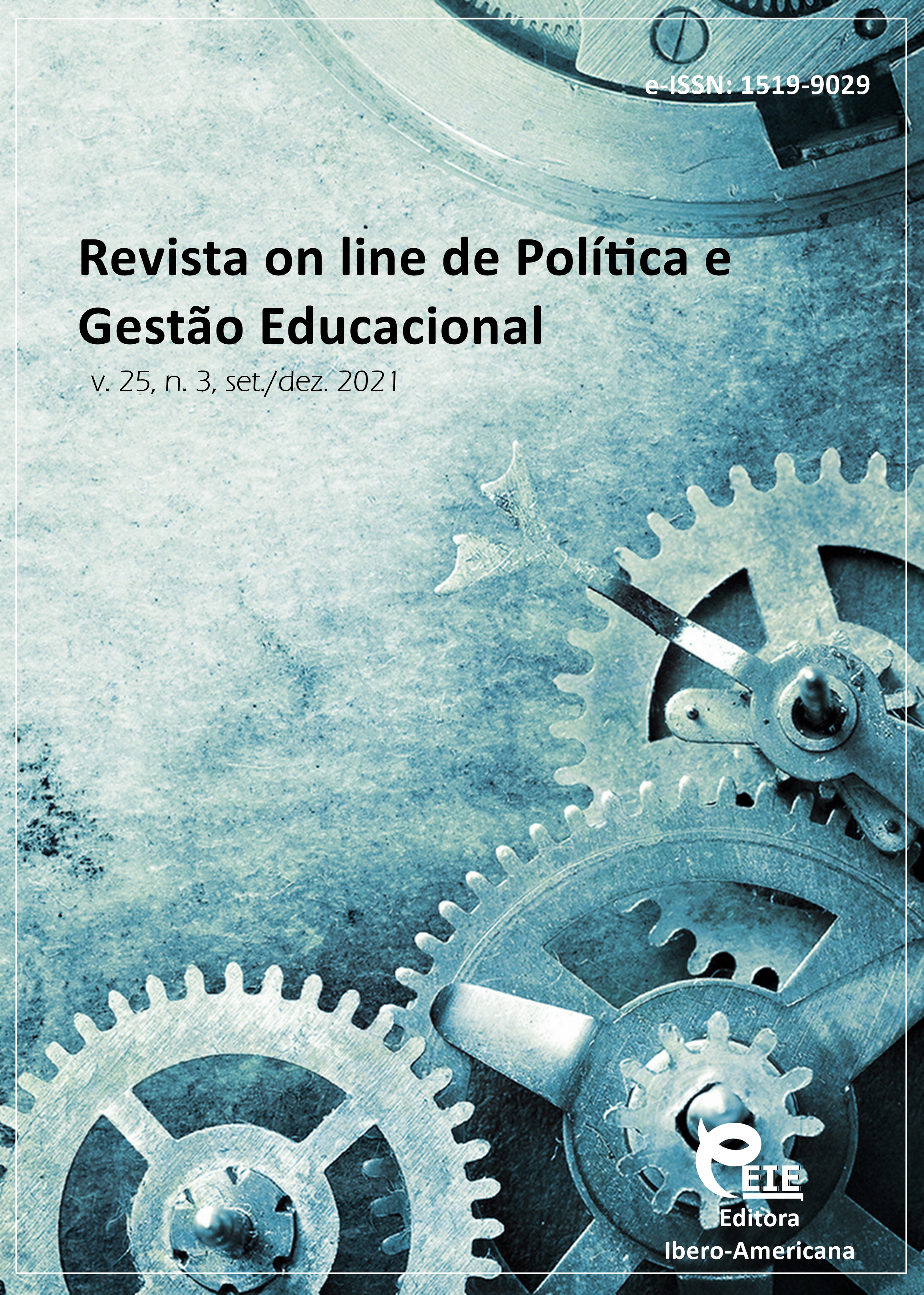A modernização da formação profissional dos futuros especialistas no domínio do design publicitário em instituições de ensino superior
DOI:
https://doi.org/10.22633/rpge.v25i3.16093Palavras-chave:
Informatização, Comunicação profissional, Redes sociaisResumo
O estudo visa estabelecer a eficácia da informatização do processo de aprendizagem de línguas estrangeiras na comunicação profissional e viabilizar a utilização de redes sociais, aplicativos de mensagens em nuvem, plataformas educativas na preparação de futuros especialistas para a comunicação profissional num ambiente de línguas estrangeiras. Os métodos de investigação são o método da experiência pedagógica, o método de questionamento, observação, método descritivo, métodos de síntese e análise. A hipótese principal do estudo é que a aplicação do potencial educativo das redes sociais, plataformas, mensageiros, questionários é um método eficaz de formação de um especialista com alto nível de proficiência em línguas estrangeiras na esfera profissional. O resultado do estudo determina a eficácia da utilização do processo de informatização ao nível do envolvimento de redes sociais e mensageiros para formar um elevado nível de proficiência em línguas estrangeiras por profissão.
Downloads
Referências
GILOI, S.; DU TOIT, P. Current approaches to the assessment of graphic design in a higher education context. The International Journal of Art & Design Education, Corsham, v. 32, n. 2, p. 256-268, 2013. https://doi.org/10.1111/j.1476-8070.2013.01758.x
HAPSARI, P. D.; WIRAWAN, F. The Significant Connection between Communicative Competence and Cognitive Ability in Speaking English of English Debating Team. Humaniora, Jakarta Barat, v. 9, n. 2, p. 149-156, 2018. https://doi.org/10.21512/humaniora.v9i2.4492
HUI, P. On enhancing students’ discourse competence in reading. Journal of Higher Education Reaches, Singapore, v. 2, n. 1, p. 22-28, 2021. https://doi.org/10.32629/jher.v2i1.252
JONES, J. F. From Silence to Talk: Cross-Cultural Ideas onStudents Participation in Academic Group Discussion. English for Specific Purposes, Atlanta, v. 18, n. 3, p. 243-259, 1999. https://doi.org/10.1016/S0889-4906(97)00059-8
KARPUSHYNA, M.; BLOSHCHYNSKYI, I.; NAKONECHNA, A.; SKYBA, K. Creating meaningful foreign language environment by means of content-based starters. Universal Journal of Educational Research, San Jose, v. 7, n. 12, p. 2710-2716, 2019. https://doi.org/10.13189/ujer.2019.071219
KO, J.; SAMMONS P.; BAKKUM, L. Effective Teaching: a review of research and evidence. Reading: CfBT Education Trust, 2013.
KÖKTÜRK, Ş.; ÖZTÜRK, E. Forms and Multifunctionality of Interruptions and Simultaneous Speaking in Ordinary Talk – proposal of a Universal Model for the Evaluation of Interruptive Speech Sequences. International Journal of Linguistics, Las Vegas, v. 4, n. 3, p. 551-571, 2012. https://doi.org/10.5296/ijl.v4i3.2137
KOSTIKOVA, I.; MIASOIEDOVA, S.; RAZUMENKO, T.; CHERNENKO, A.; POCHUIEVA, O. Teaching English speaking for FCE: using Facebook as a tool of instructional practice. Amazonia Investiga, Florencia, v. 8, n. 22, p. 719-727, 2019. Available: https://amazoniainvestiga.info/index.php/amazonia/article/ view/825/773. Access: 23 Dec. 2021.
MASON, R. Learning technologies for adult continuing education. Studies in Continuing Education, Sydney, v. 28, n. 2, p. 121-133, 2006. https://doi.org/10.1080/01580370600751039
NASIRI, A.; GILAKJANI, A. P. А review of EFL learners’ speaking skill and the strategies for improvement. Modern Journal of Language Teaching Methods (MJLTM), Tehran, v. 6, n. 9, p. 56-63, 2016. http://dx.doi.org/10.26655/mjltm.2016.12.1
NOON-URA, S. Teaching listening speaking skills to Thai students with low English proficiency. Asian EFL Journal, Niigata, v. 10, n. 4, p. 173-192, 2008. Available: https://www.asian-efl-journal.com/main-editions-new/teaching-listening-speaking-skills-to-thai-students-with-low-english-proficiency/index.htm. Access: 23 Dec. 2021.
OSMANBEGOVIC, E.; SULJIC, M. Data Mining Approach for Predicting Student Performance. Economic Review: Journal of Economics and Business, Tuzla, v. 10, n. 1, p. 3-12, 2012. Available: https://www.econstor.eu/handle/10419/193806. Access: 23 Dec. 2021.
RABABAH, І. H. M. The Reality of Using Modern Teaching Methods in Teaching Arabic for Speakers of other Languages from Teachers’ Perspective. Journal of Social Sciences, Houston, v. 9, n. 1, p. 58-94, 2020. https://doi.org/10.25255/jss.2020.9.1.58.94
SALGUR, S. A. The importance of the teacher in intercultural education. International Journal of Global Education, Famagusta, v. 2, n. 1, p. 1-5, 2013. Available: http://www.ijge.net/index.php/ijge/article/view/41. Access: 23 Dec. 2021.
SCHNEIDER, K.; BERENS, J.; BURGHOFF, J. Drohende Studienabbrüche durch Frühwarnsysteme erkennen: Welche Informationen sind relevant? Zeitschrift für Erziehungswissenschaft, Bamberg, v. 22, n. 5, p. 1121-1146, 2019. https://doi.org/10.1007/s11618-019-00912-1
WANG, Y. Big Opportunities and Big Concerns of Big Data in Education. TechTrends, Statesboro, v. 60, n. 4, p. 381-384, 2016. https://doi.org/10.1007/s11528-016-0072-1
WILLIAMSON, B. Digital education governance: data visualization, predictive analytics, and ‘real-time’ policy instruments. Journal of Education Policy, London, v. 31, n. 2, p. 123-141, 2016. https://doi.org/10.1080/02680939.2015.1035758
Downloads
Publicado
Como Citar
Edição
Seção
Licença
Copyright (c) 2021 Revista on line de Política e Gestão Educacional

Este trabalho está licenciado sob uma licença Creative Commons Attribution-NonCommercial-ShareAlike 4.0 International License.
Manuscritos aceitos e publicados são de propriedade da Revista on line de Política e Gestão Educacional. É vedada a submissão integral ou parcial do manuscrito a qualquer outro periódico. A responsabilidade do conteúdo dos artigos é exclusiva dos autores. É vedada a tradução para outro idioma sem a autorização escrita do Editor ouvida a Comissão Editorial Científica.











